
- Home
- India
- World
- Premium
- THE FEDERAL SPECIAL
- Analysis
- States
- Perspective
- Videos
- Sports
- Education
- Entertainment
- Elections
- Features
- Health
- Business
- Series
- In memoriam: Sheikh Mujibur Rahman
- Bishnoi's Men
- NEET TANGLE
- Economy Series
- Earth Day
- Kashmir’s Frozen Turbulence
- India@75
- The legend of Ramjanmabhoomi
- Liberalisation@30
- How to tame a dragon
- Celebrating biodiversity
- Farm Matters
- 50 days of solitude
- Bringing Migrants Home
- Budget 2020
- Jharkhand Votes
- The Federal Investigates
- The Federal Impact
- Vanishing Sand
- Gandhi @ 150
- Andhra Today
- Field report
- Operation Gulmarg
- Pandemic @1 Mn in India
- The Federal Year-End
- The Zero Year
- Science
- Brand studio
- Newsletter
- Elections 2024
- Events
- Home
- IndiaIndia
- World
- Analysis
- StatesStates
- PerspectivePerspective
- VideosVideos
- Sports
- Education
- Entertainment
- ElectionsElections
- Features
- Health
- BusinessBusiness
- Premium
- Loading...
Premium - Events
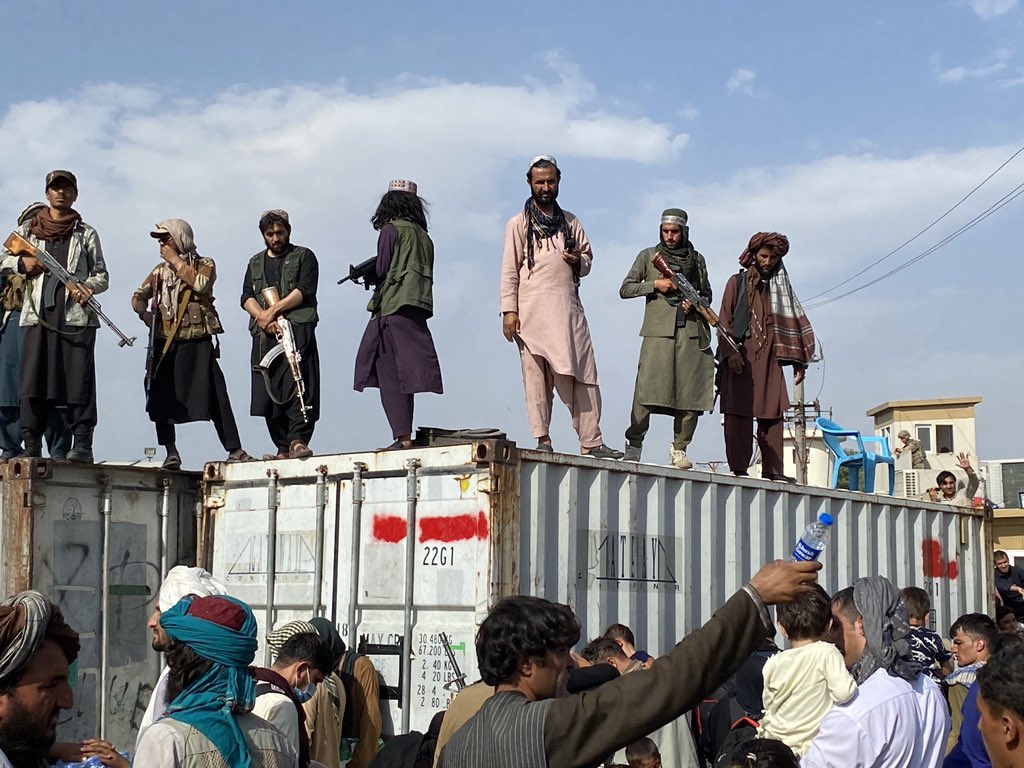
Facing the fear: ‘It’s over, the Talibs have arrived in Kabul’
The word was out that the Taliban had arrived inside the capital. People outside started running in all directions. It was complete chaos.

August 15, 2021, the day India celebrated its 75th Independence Day, its closest northwestern ally was taken over by the Taliban, an army of Soviet-era Mujahids that came back to power after two decades. On the morning of August 15, the streets were unusually calm. For a weekday (Sunday is a weekday in Afghanistan), the streets were empty with just a handful of taxis on the road. I was...
August 15, 2021, the day India celebrated its 75th Independence Day, its closest northwestern ally was taken over by the Taliban, an army of Soviet-era Mujahids that came back to power after two decades.
On the morning of August 15, the streets were unusually calm. For a weekday (Sunday is a weekday in Afghanistan), the streets were empty with just a handful of taxis on the road. I was scheduled to meet Laila (name changed to protect identity), the executive director of a project run by the Ministry of Women’s Affairs to socially and financially empower women in rural Afghanistan.
I arrived at her office at 9.30am. She was seated behind her large desk in an imposing office, ready to take some hard calls and decisions in the face of the growing crisis in her beloved country. We had a lengthy discussion on how they plan to run the project and how feasible it will be if the Taliban came to power. She seemed hopeful. She gave me the assurance that they will work hand-in-glove with whoever is in power. It is, after all, for the benefit of this country’s women, she said at that moment.
Our conversations were interrupted by a security briefing for women staff in her office that was added to her agenda at the last minute. Laila welcomed me to join this meeting and invited me to speak to her colleagues about the growing security concerns. The room was filled with at least 12-15 women. They all seemed apprehensive of what was to come.
“On behalf of all the women here, I would like to share our concerns. Actually we are worried about women’s rights because we had already experienced from the Taliban what they are capable of. We have seen what they have done in the past and we are worried they will do the same to us this time as well. We don’t want to lose our achievements. We have done a lot for Afghan women in these 20 years. We don’t want to lose our rights and freedom,” one of them said.
While we were in the middle of this conversation, panic broke out in the room. While their cellphones started buzzing, the people outside started running in all directions. It was complete chaos. The word was out that the Talibs had arrived inside the capital.
The women in the room just got up and started crying. Their hands shaking with fear, their hopes dashed to the ground. They were incoherent in their moment of frenzy, but they all seemed to be saying that “it is over”.
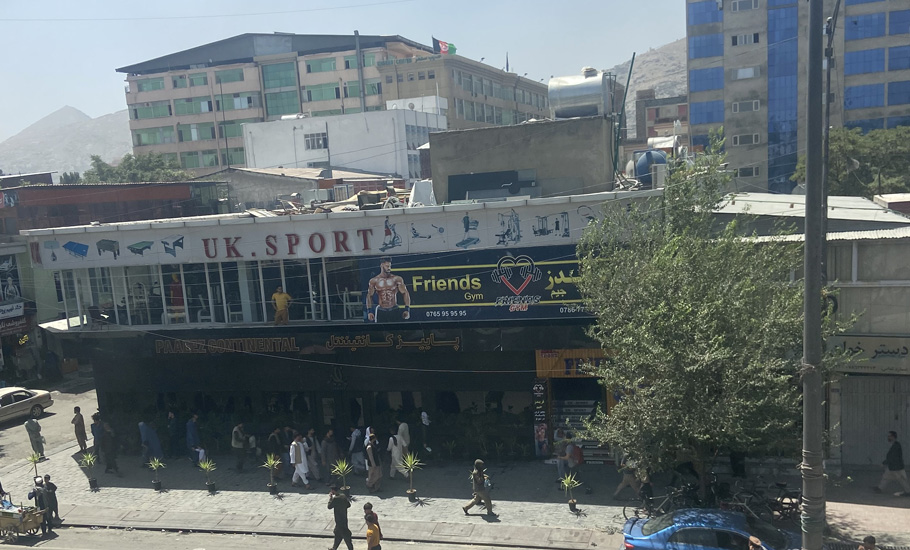
It was a difficult thing to watch. A room full of capable women who worked so hard for decades will now have to go back inside the elusive world of a chadori (an all-enveloping blue veil that the Taliban introduced in the 1990s). I watched helplessly, as silent tears rolled down my cheeks. Laila, their boss who has seen the Taliban of the 1990s stood at the helm of her table, taking it all in. She gracefully reassured her staff that everything will be alright. She was poised, surprisingly at ease, taking in the manic activity of the room.
Within minutes she arranged for a safe transport to send her staff, leaving her “security briefing” midway. I, along with Laila, stayed behind to look for alternative ways to go home.
The street outside had picked up a frenzied activity. People were running, walking quickly, or just trying to wrap their heads around the new reality. It was surreal. All of it. I had never seen the streets of Shahr-e-Naw appear this lonely. At any given time, one had to cross the bumper-to-bumper traffic, a short distance of 10-15km taking at least an hour to cover. But on that day, no one had anywhere to go other than the security of their homes.
My journey home from the office was equally unnerving. Unsure of what is happening outside the ministry complex, I stood by the window of the building and assessed the situation outside. I have always seen downtown Kabul pulsating with energy. So, it did not seem out of place that the people were hurriedly going somewhere. It fit into the vibe of the city. What I could not see was the fear in their eyes and panic in their pace.
After about an hour waiting for a safe transport, I finally left with Laila to my apartment building that was a short distance from her office. I saw people closing shops midday and the streets already devoid of its regular human and vehicular traffic.
As I was waiting for the elevator, I met an Afghan Customs’ official. He seemed visibly confused and unsure about anything at that point. The elevator suddenly seemed to have broken down, everything else around me appeared to have come to a halt.
Just then he blurted out, “I am really nervous about all this. They have come inside Kabul. You are a journalist. Do you know what they plan to do with government officials?” His worry was not unfounded. There were disturbing reports from parts of the country that the Taliban were conducting house-to-house search operations to look for people who served the government or the Americans. No one knows what happened to those people.
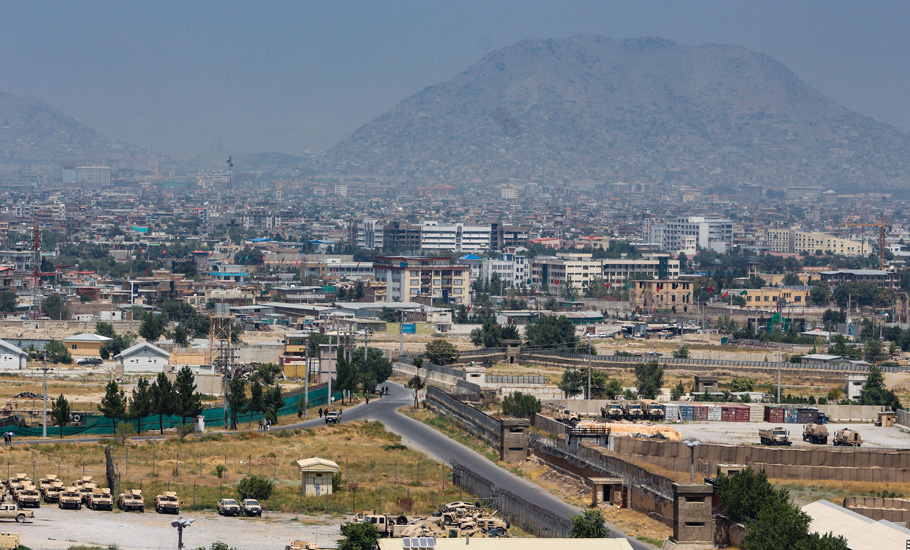
I wish I could say something reassuring to him but I was equally confused, if not shocked. Just the night before, I was evicted from my last home that I was sharing with some friends who were government employees. “We don’t want you to be in trouble because you are staying here, nor do we want to be in any kind of trouble for hosting an Indian.”
Everything around me was starting to crumble. I had planned to leave the country on August 18 and booked my ticket a month ago. Little did I know that my exit from the country would be jeopardised at every step of the way. As I saw the destruction around me, occasional gun-firing interrupting my thoughts, I realised that this would be the longest three days I would have to spend in Afghanistan.
As I was still contemplating my exit, the reports came in that the Kabul airport was under siege by desperate locals trying to escape the country in a last-ditch effort. Some people were killed in the commotion that ensued, some died clinging to the wheels of a plane that was bound westward. But as I saw the situation at the airport, I knew that the door had been closed for me, for now. Then came the update that the airspace was closed, too. So, no commercial flights would be allowed to operate.
The situation in Kabul was changing so quickly that an unprepared person like me was stuck in the middle of this vortex with no way out. I tried frantically to contact the Indian Embassy to get an update on the situation. I begged them to host me at the embassy compound until we knew how to safely get out of the country. But at every step, I got admonishment about the unheeded security advisories.
On the morning of August 16, we got some disturbing news. The Taliban came asking for me and the other friend sharing a house in the city center. The fact that they knew about us and came asking for us was enough to speed up the evacuation efforts. I called up all my friends who had the remotest connection with our ministry in India so that they could help us get out or give us a safe haven inside the embassy. I was angry and frustrated at the radio silence I got from the officials.
My parents reached out to the Ministry of External Affairs, some journalist friends put pressure from their end, my friends from various spheres just kept pressing on to put me on the first flight out.
By this time, the scenes outside my window in Kabul gave a false sense of normalcy. People outside my apartment building had already accepted the new reality. I could sense more resignation than resistance.
“The Taliban are everywhere. But they did not trouble us. I don’t care who is in power. I just want to live peacefully. Look at Ghani, he ran away,” a local told me when I asked him what he thinks about the country now that it was officially taken over by the Taliban.
President Ghani stepped down from his seat of power after months of reassurances that he has the war in control. He was trapped by the Taliban from all sides and made to agree to their terms to relinquish power. His fleeing from the country created a sense of betrayal among the residents who were learning to adjust to the new normal.
As I was thinking of ways to escape the country on the verge of collapse, I got a call from the Indian Embassy officials to make it to their office on my own. I was not given any security cover—just instructions to come within the next two hours.
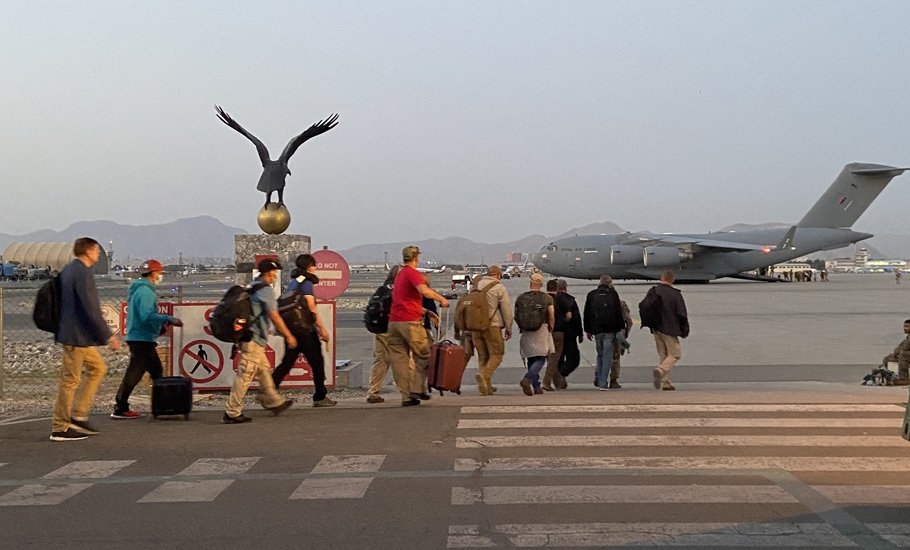
I and another Indian friend took it upon ourselves to brave what lies outside my apartment building and make the final journey into the unknown.
I packed all my important stuff, gathered the remaining courage, and decided to go to the embassy in a local cab. Seated behind, covered in layers and layers of fabric, I took stock of the situation outside the car window. Kabul was still in shock, staying indoors mostly, some small shops were open.
The banks were closed for the past two-three days. The ATMs were sucked dry as people panic-withdrew all the money. Just a handful of shops were open, catering to a very small number of people. I was taking it all in, looking at the lull before a storm from the slit of my face cover.
The mood in the car was pensive and edgy. When we arrived at the Green Zone—an area where foreign embassies and government buildings are housed—we were stopped at the Taliban checkpoint. We called the Indian embassy official to know the next steps as to how to enter inside as we were denied entry.
“You need to negotiate with the Taliban at the entry gate. We are not allowed to engage them. Use the woman card,” the embassy official told me on the phone.
I decided to go and talk to the “scary” Talib myself. I was somehow sure that he would allow a lone woman to reach the safety of the embassy. I was wrong.
I stood near the boom barrier and looked at the young Talib in front of me, manning the entrance to the embassy that was still 2 km away from this point. He must have been around 20, and spoke good English. His face was covered with a black shawl—as if to hide the appearance of a stubble that does not conform to the Taliban’s code of long beard. I looked at him for a long time as my driver requested him to let us in. In one swift motion of his hand, he refused.
“No, go away. The embassy is closed.” The tone of finality in his voice didn’t give me a chance to present my case. He continued to discourage me from going in. I continued to press my case. I wasn’t going back after coming this far.
As I tried to talk to him directly, he looked away. My attempt to engage him in a direct conversation was something he did not expect. Every time I tried to talk to him, he looked away and replied to my driver instead. I realised that this was not going to work. So I approached another one of the Talibs who seemed more sympathetic towards me.
He asked me to bring my passport which I hurriedly did. I wanted to prove to them that I did not mean any harm and just wanted to go inside. He took my passport from me and kept it with him. When I asked him for the passport, he told me to bring the other woman who was waiting in the car.
Things were getting out of control and I was losing sight of our objective to go past the Taliban and into the safety of our embassy. It took her about 15 minutes to convince them to give her my passport. She came back, angry and shocked at my stupidity, “never give anyone your passport, ever,” she said as she handed me the most important document with me that day.
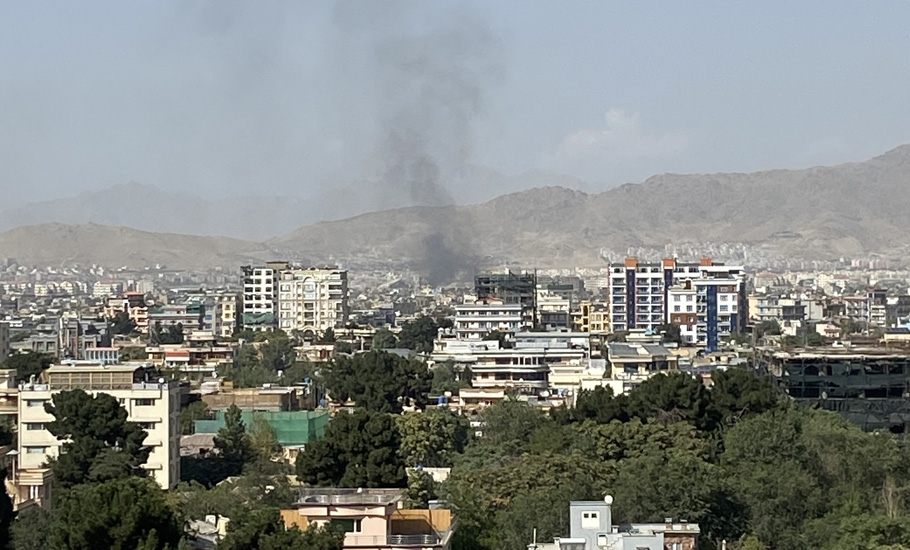
At this point, we decided to not push the matter any further and wait for the embassy convoy to come and pick us up from the street. We parked ourselves in front of the mosque and waited for two hours.
The streets were inundated with heavily armed Talibs. I was still shocked to see a ragtag army of young foot soldiers in a pickup truck now defenders of “peace and security” in Afghanistan.
After two hours, we tried again to enter the Indian embassy and this time we were allowed after their leader had a talk with the embassy officials. As we crossed the Taliban checkpoint, their leader signaled us to sit in a car. The street ahead of us was dark and ominous. But sitting in his car seemed like an even more dangerous prospect. I tried to put up a brave face and refused. “I know where the embassy is. It’s ok. We can walk till there,” I told him. But he insisted that we sit in the car and we had no choice but to comply.
Thankfully, his only intention was to safely drop us outside the embassy. Just 200 metres away from the embassy, officials came and requested the Talibs to hand us over to their car which they did.
I breathed a sigh of relief as I entered the embassy compound. First part of our struggle was over. Or so we thought.
The embassy officials opened up their new guestrooms for us to freshen up and gave us the impression that we may have to stay there for two-three days. By this time, it had been more than 48 hours since I had eaten anything. I was hungry, exhausted, and desperate to go home.
Just when they gave us a call for dinner, another call came that we were evacuating. The security briefing was sharp “do not leave the car, no matter what happens”.
As we left the embassy compound, the Taliban appeared to be waiting outside to coordinate our safe arrival to the airport.
We were led and tailed by a Taliban vehicle to the airport perimeter. There were tons of people waiting outside, hoping and desperately trying to get in. As our convoy of 22 cars arrived at the airport gates, they lined themselves alongside the vehicles to go inside with the convoy. The Taliban managed security and crowd-control outside the airport. After waiting for two hours, we were made to turn around and take another entrance that was manned by the American and Turkish forces.
We arrived at the immigration terminal after six hours of leaving the embassy. The scenes around us were that of fatigue—a fatigued American soldier fighting a lost cause, a fatigued Afghan forced to leave his home behind, a fatigued expat who did not get a chance to say goodbye to anyone.
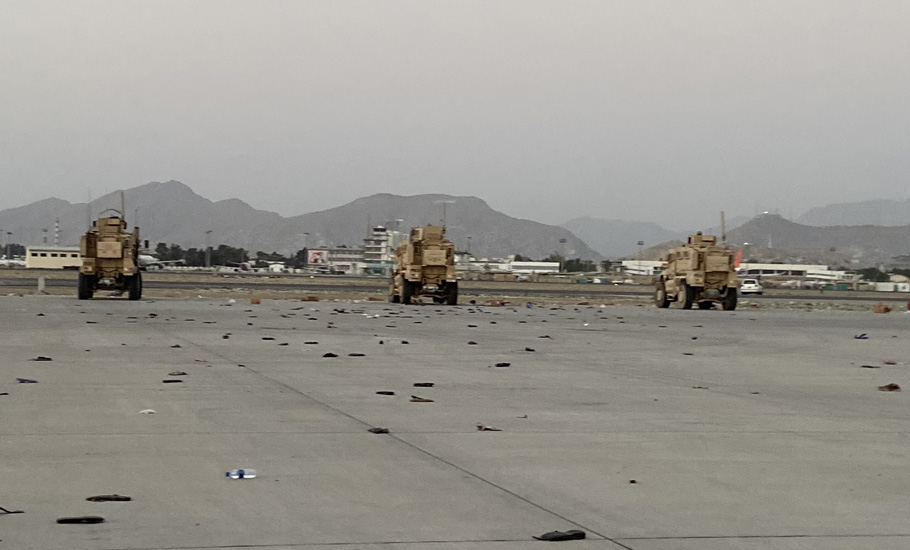
I absorbed the scenes around me. The whole airport that was shrouded in a thick blanket of silent night was suddenly opening up to a twilight zone. The last of Americans were hurriedly walking in a single file towards the evacuation plane that will fly them to the safety of their country.
I was to board one of these C-17s too. But one last look at the airport tarmac revealed scenes of desperation as I could see thousands of shoes strewn all over the place, half-empty bottles of water, a dupatta that a woman left behind in hopes of never to forcibly cover herself again.
I boarded the plane with a heavy heart—happy to be going home, sad to be abandoning a country when it needed journalists the most.
